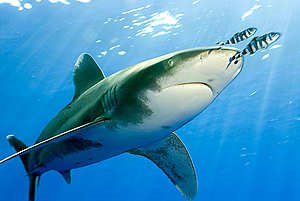Thursday, June 25, 2009
Third of Pelagic Sharks Threatened with Extinction
 The first study to determine the global conservation status of 64 species of open ocean (pelagic) sharks and rays reveals that 32 percent are threatened with extinction, primarily due to overfishing, according to the IUCN Shark Specialist Group.
The first study to determine the global conservation status of 64 species of open ocean (pelagic) sharks and rays reveals that 32 percent are threatened with extinction, primarily due to overfishing, according to the IUCN Shark Specialist Group.“Despite mounting threats, sharks remain virtually unprotected on the high seas,” says Sonja Fordham, Deputy Chair of the IUCN Shark Specialist Group and Policy Director for the Shark Alliance. “The vulnerability and lengthy migrations of most open ocean sharks mean they need coordinated, international conservation plans. Our report documents serious overfishing of these species, in national and international waters, and demonstrates a clear need for immediate action on a global scale.”The report comes days before Spain hosts an international summit of fishery managers responsible for high seas tuna fisheries in which sharks are taken without limit. It also coincides with an international group of scientists meeting in Denmark to formulate management advice for Atlantic porbeagle sharks.
The study reports the Great Hammerhead (Sphyrna mokarran) and Scalloped Hammerhead (Sphyrna lewini) sharks, as well as Giant Devil Rays (Mobula mobular), as globally Endangered and facing a very high risk of extinction in the wild. Smooth Hammerheads (Sphyrna zygaena), Great White (Carcharodon carcharias), Basking (Cetorhinus maximus), Oceanic Whitetip (Carcharhinus longimanus), two species of Mako (Isurus spp.) and three species of Thresher (Alopias spp.) sharks are classed as globally Vulnerable to extinction ( facing a high risk of extinction in the wild).

Scalloped hammerhead (Sphyrna lewini)
(Image: Simon Rogerson)
Many open ocean sharks are taken mainly in high seas tuna and swordfish fisheries. Once considered only incidental “bycatch”, these species are increasingly targeted due to new markets for shark meat and high demand for their valuable fins, used in the Asian delicacy shark fin soup. To source this demand, the fins are often cut off sharks and the rest of the body is thrown back in the water, a process known as “finning”. Finning bans have been adopted for most international waters, but lenient enforcement standards hamper their effectiveness.

Oceanic Whitetip (Carcharhinus longimanus)
(Image: Simon Rogerson)
Sharks are particularly sensitive to overfishing due to their tendency to take many years to mature and have relatively few young. In most cases, pelagic shark catches are unregulated or unsustainable.
The IUCN Shark Specialist Group is calling on governments to set catch limits for sharks and rays based on scientific advice and the precautionary approach. It further urges governments to fully protect Critically Endangered and Endangered species of sharks and rays, ensure an end to shark finning and improve the monitoring of fisheries taking sharks and rays.

Silky (Carcharhinus falciformis)
(Image: Jeremy Stafford-Deitsch)
The IUCN uses a series of categories to classify species
| EXTINCT | The last individual has died |
| EXTINCT IN THE WILD | Only survives in captivity or cultivation |
| CRITICALLY ENDANGERED | Facing an extremely high risk of extinction in the wild |
| ENDANGERED | Facing a very high risk of extinction in the wild |
| VULNERABLE | Facing a high risk of extinction in the wild |
| NEAR THREATENED | Likely to qualify for, a threatened category in the near future |
| LEAST CONCERN | Does not qualify for any of the above |
is the world’s largest global environmental network. It is a
membership union with more than 1,000 government and
non-governmental member organisations and almost 11,000
volunteer scientists in more than 160 countries.
Further Reading:
The Conservation Status of Pelagic Sharks and Rays: Report of the IUCN Shark Specialist Group Pelagic Shark Red List Workshop
IUCN Red List Categories and Criteria booklet
Related Stories:
EU launches shark protection plan
Caribbean Big Fish Disappearing
Mediterranean Sharks Declining Fast
Mexico Passes Shark Finning Ban
Four Times more Sharks caught than Officially Reported
What do you think of this news item? Join a discussion.
Labels: fish, marine biology, research, SCUBA News, sealife, sharks